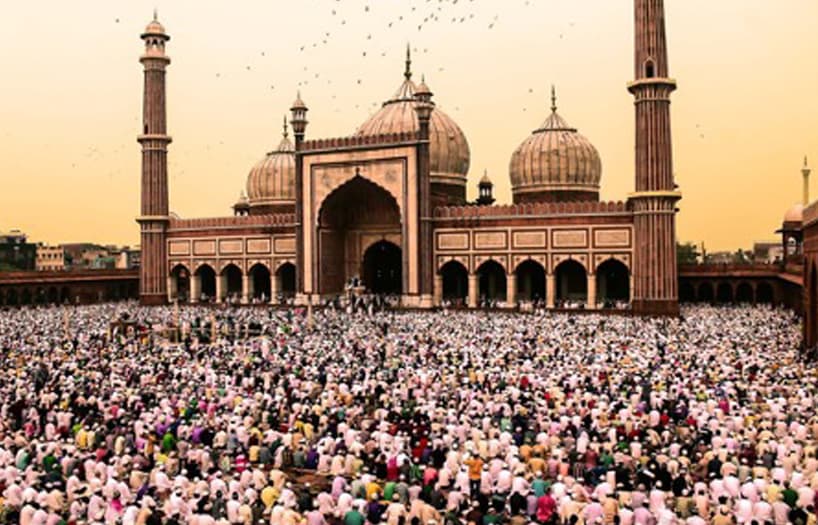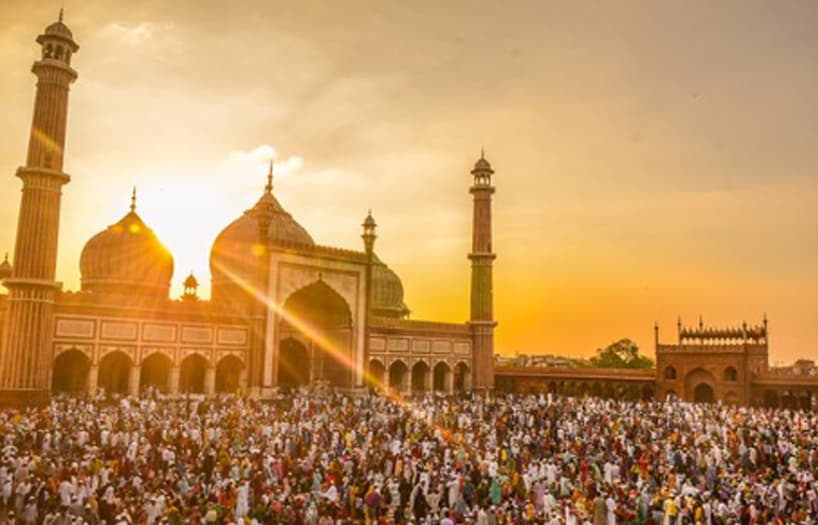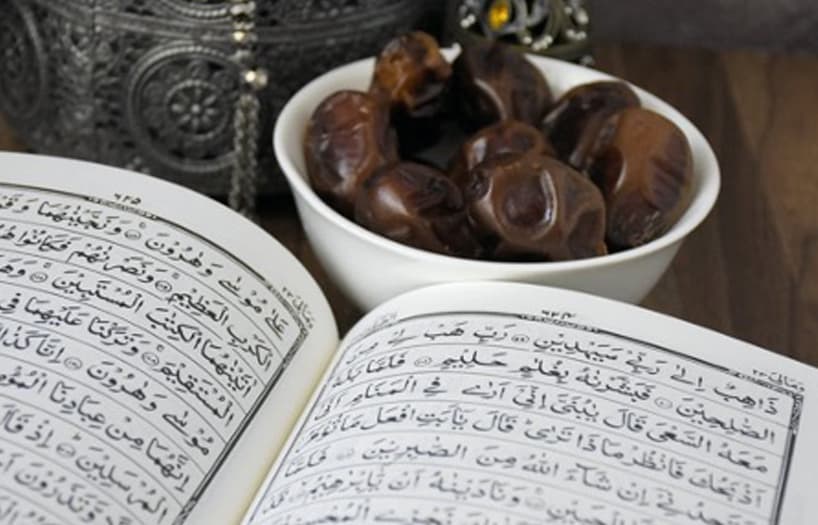Ramadan
1.Ramadan
2.Intention
3.Indebtedness
4.Doing good deeds
5.Suhur
6.Iftar
7.Iftar
8.The Last Ten Days of Ramadan
9.The night of al-Qadr
10.The night of al-Qadr
11.Zakat al-fitr
12.Ramadan in the Quran
13.Greetings
14.Timing
Ramadan (Arabic: رمضان [ra.ma.dˤaːn]) or Ramazan (Turkish: Ramazan [ɾɑmɑˈzɑn]) is a month of fasting (saum), one of the five pillars of Islam. During the month of Ramadan, faithful Muslims renounce eating, drinking, smoking, and intimacy during the day. The month lasts 30 days and depends on the lunar calendar (see the Islamic calendar). The fast begins at the beginning of dawn (after the morning azan) and ends after sunset (after the evening azan).

Muslims intend to observe the fast every day before the start of the fastCome to the section “#Murder”. It is preferable for Muslims to begin the fasting (iftar) immediately after the time of the fasting. It is recommended to partake of the fasting with water, milk, dates, etc. This is recommended to go to “#Iftar” section. Every day after the night prayer (isha), Muslims collectively perform the voluntary Tarawih prayer that consists of 8 or 20 rakats. On the last ten days of the month comes the night of al-Qadr (night of might, night of predestination) Go to “#Night of al-Qadr”. On the first day of the month of Shawwal, the Feast of Eid is held to commemorate the end of Ramadan. On this day, Muslims perform festive prayers and pay the obligatory almsgiving.
Complete renunciation of simple human needs, even on the hottest and most grueling days, gives Muslims an opportunity to demonstrate the power of their faith. During fasting Muslims strive to curb their instincts and passions (nafs). Apart from external purity, during this month of fasting one tries to maintain a stricter internal purity, i.e. the liberation from all thoughts and actions that defile one. A Muslim who fasts whose thoughts and deeds are impure and not profane is considered to be in vain, for “Allah has no need to abstain from eating and drinking from one who has not forsaken falsehood.

In this month Muslims approach the performance of prayers more responsibly than in normal months, reading the Qur’an, doing good deeds, giving voluntary (sadaqah) and obligatory (zakat) alms. Many Muslims who, for whatever reason, stop performing namaz are more likely to return to observing this pillar of Islam in this month. Many Muslims look forward to the month of Ramadan with reverence.
Intention
The obligatory condition for fasting is the intention (niyat) to do it. The intention is affirmed in the heart every day between the night (isha) and morning (fajr) namaz. According to some theologians, it is enough to affirm it only at the beginning of the month.
Indebtedness
Breaking the fast during Ramadan without a good reason is considered a sin. According to one of the five pillars of Islam: For an unintentional breaking of the fast for a good reason (serious illness, hadd), a Muslim must make up for the missed fast by 1 day of fasting or pay a certain amount equal to 1 sa`a of wheat or food bought with that amount of money to a needy person.
For missing the fast for a good reason, he must keep the fast on any day convenient for him until the next month of Ramadan.
For committing sexual intercourse in the daylight hours one must make up for that day with 60 days of uninterrupted fasting or feed 60 poor people.
Doing good deeds
According to the authentic Hadith and the Qur’an, doing good deeds is considered especially important. According to the sayings of the Prophet Muhammad, Allah increases the importance of each of them by 700 times, and shaitan is chained in this month, so it becomes much easier for Muslims to do them than in other months. Orthodox Muslims in Ramadan try to spend more time in prayer and recitation of the Koran, to give alms, and to perform other good deeds.
Suhur

Suhur (Arabic سحور) is eating early in the morning during the month of Ramadan. The food is eaten before the Fajr prayer (before dawn). Suhur and iftar (evening meal) during Ramadan replace the traditional three meals a day (breakfast, lunch and dinner). For Muslims it is preferable to perform Suhoor on the eve of the first signs of dawn, as the reward (Savab) from Allah for fasting will be greater in this case. If the fasting person does not eat before dawn, then his fast remains valid, but he will lose some of his reward because he did not perform one of the actions related to the Sunnah of the Prophet Muhammad.
Iftar
Iftar (Arabic إفطار) is the evening meal during the month of Ramadan. It is held after the evening prayer according to the local time. Iftar begins immediately after sunset. Postponement of the meal to a later time is undesirable. The Sunnah starts with dates or water. The Prophet Muhammad said: “When any of you will fast, let him fast with dates, and if he cannot find dates, let him fast with water, for verily it purifies.” After the iftar is performed, the following prayers (dua) are recited:
“O Lord, I have fasted for You (for Your pleasure in me) and, using Your benefits, I have fasted. In You I hope and in You I trust. Forgive me, O One whose mercy is infinite. Praise be to the Most High Who helped me to fast and fed me when I was fasting.”[7]
“O Allah (O Lord)! For the sake of Your contentment with me I have fasted, believed in You, relied on You, and accomplished a fasting using Your gifts. Forgive me past and future transgressions, O All-forgiving One!”
Tarawih
Tarawih (Arabic تراويح – break, rest, respite) is a voluntary prayer that takes place after the obligatory night prayer (isha) and lasts until dawn. Tarawih prayer is performed both individually and collectively. Tarawih is plural from the Arabic word tarvikha, which means ‘rest’ in Russian. The prayer is so called because after each of its four rakaats, the prayers sit and rest, praising the Lord or listening to the imam’s admonitions. In the time of the Prophet Muhammad, taraweeh was performed in eight and

twenty rakaat, but the taraweeh consisting of twenty rakaat was finally approved by Caliph Umar with the consent of the Sahab. According to the opinion of four Sunni madhhabs, taraweeh prayer is performed in 20 rakaat (10 prayers of 2 rakaat). It is performed every day during the whole month of Ramadan after the night prayer (isha). In the time of the Prophet Muhammad’s companions, after every four rakaat there was a short break, during which Allah was praised and remembered, or a short sermon was preached.
The Last Ten Days of Ramadan
During the last ten days of Ramadan, Muslims are advised to perform various types of worship, particularly staying in mosques, following the example of the Prophet Muhammad
The night of al-Qadr
Night of Predestination (Arabic لَيْلَةِ الْقَدْرِ – Laylati l-kadr), also Night of al-Qadr, Night of Might is a holiday in Islam celebrated on the 27th night of Ramadan in honor of Muhammad’s discovery of the first surah of the Quran in 610 in the Hira Cave of Jabal al-Nur Mountain.

On this night, according to Islamic sources, the archangel Jabrail appeared to the praying Muhammad and, pointing to the scroll, said: “Read!” (the Koran!). The Night of Predestination is celebrated at the end of the ninth month of Ramadan. On the night of predestination, it is customary to ask God’s forgiveness for the sins committed and to read the Koran.
Uraza Bayram
On the first day of the month of Shawwal, Eid al-Fitr (Turkic for “Uraza Bayram”) is celebrated to mark the end of Ramadan. On this day, Muslims perform Eid prayer and pay the obligatory almsgiving (zakat al-fitr).
Zakat al-fitr
Zakat al-fitr (Arabic زكاة الفطر – almsgiving) is alms to be paid to needy Muslims before Eid al-Fitr. Paying Zakat al-Fitr is an obligatory act (Wajib) for Muslims. The head of the family pays alms for all members of his family who are in his care. If a child is born after sunset on the last day of the month of Ramadan, then zakat al-fitr is not paid for him.
Zakat al-fitr can be paid to an authorized person at the mosque or in person to those in need. The amount of almsgiving is 1 saa of the crude substances common in the area where it is paid. Thus, for example, in Europe it is recommended to pay with wheat and barley, in Southeast Asia – with rice, in the

Middle East – with dates. Sa’ah is a measure of weight equal to 3,500 g (in the Hanafi madhab), or 2,176 g (in the rest of the Sunni madhab). In the Hanafi madhhab, half of the sa’ah is paid. Zakat al-Fitr is best paid in the form of food, as it was done in the time of the Prophet Muhammad. The payment of alms in cash equivalent is permitted in the Hanafi madhhab. The purpose of paying zakat al-fitr is to atone (kaffar) for possible errors and omissions made during the month of fasting and to help the poor and needy to celebrate Eid al-fitr with other Muslims.
Ramadan in the Quran
Ramadan is mentioned once in the Qur’an: “You should fast a number of days. And if any of you is sick or on a journey, let him fast the same number of days at another time. And those who are able to fast with difficulty should, as atonement, feed a poor man. And if anyone voluntarily does a good deed, so

much the better for him. But it is better for you to fast, if you only knew! In the month of Ramadan, the
Qur’an was sent down, a sure guide for men, and clear proofs of sure guidance and discernment. Those of you who are caught up in this month should fast. And if one is sick or on the way, let him fast for as many days at another time. Allah wills that you should be relieved and He will not wish you to be hindered. He wills that you should finish a certain number of days and magnify Allah for guiding you in a straight path. Perhaps you will be thankful. In addition, the Qur’an mentions the Night of al-Qadr.
Greetins
The month of fasting is a joyous occasion for Muslims, for which they congratulate each other with the words Ramadan Karim (Arabic رمضان كريم – I wish you a generous Ramadan!) or Ramadań mubarak

(Arabic رمضان مبارك – blessed Ramadan!). The traditional wish during this month is “May Allah delight your eyes in Ramadan with sweet evenings and the friendship of the elect, the mercy of the All-forgiving and the paradise of the pious!” During the last days of the month, it is also customary to say hvatim mubarak (Arabic خواتم مباركة – blessed last days of Ramadan!). The fasting person also wishes that Allah would accept his fasting.
Timing
The beginning of each month of the Islamic lunar calendar is the day after the new moon. The lunar calendar is shorter than the Gregorian calendar by about 11 days, so each year the date of the beginning of Ramadan is shifted back about 11 days relative to the modern calendar. It is also necessary to take into account that in some Muslim countries the first day of Ramadan is determined by astronomical calculations, and in other countries by direct observation of the Moon, or can be determined on the basis of announcements by people authoritative in the Muslim world. In this regard, the beginning of the religious holiday may differ depending on the host country or weather conditions. The table to the right lists the dates of the astronomical new moon, which occurs a few hours earlier than the month of Ramadan.
